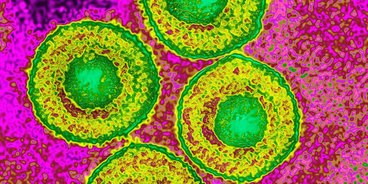|
Shingles is a name that strikes fear in many people - and if you've ever had Chicken Pox (varicella zoster virus), then you are likely concerned about it yourself. That's because the same virus that causes Chicken Pox reactivates after laying dormant for years to become a Shingles outbreak. This painful resurgence of the virus typically causes rashes, blisters, and mild to intense nerve pain. By most accounts, it is a terrible experience - but thankfully there are ways to prevent and treat Shingles. After you've been afflicted with Chicken Pox and the symptoms finally subside, the virus lays dormant in nerve roots throughout the body. This is because your immune system has become accustomed to recognizing and destroying the virus efficiently, leaving the virus no choice but to "hide out" where your immune cells cannot reach it. Any attempt of the virus to replicate results in an immune response that beats it back.
The only thing that stands in the way of the virus is your immune system, so when your immune system is compromised, the virus has a chance to replicate and quickly overwhelm you. Stress, toxins, and other factors can have the potential to greatly reduce your capacity to fight illnesses, so it's important to know not only how to boost your immune system but also to understand how viruses operate in order to avoid agitating them. Your immune system utilizes an amino acid called L-lysine in order to replicate it's own cells. Think of it as the food that the soldiers in your immune system's army need to eat in order to grow and fight. In contrast, the amino acid called L-Arginine is what viruses use in their replication process. Both of these amino acids are present in everyday foods at different ratios. As logic would dictate, you need to consume more L-Lysine than L-Arginine if you are trying to prevent or treat the virus. Having a well-fed immune army battling a poorly fed viral army spells victory for us, the hosts. L-Lysine is available as a supplement at many health food stores, as well as online. It is inexpensive and safe to take regularly. A typical recommendation is approximately 1-3 grams daily. If you are taking more than what your body needs, you'll notice a slight maple syrup odor in place of your natural underarm body odor. In that event, just reduce the amount you intake daily until the odor subsides. L-Lysine is also present in a higher ratio than L-Arginine in foods like cheese and fish. A list of foods high in Lysine can be found by clicking here. L-Arginine is present in a higher ratio than L-Lysine in foods like orange juice, wheat and nuts. These should be avoided when Shingles is emerging, so foods like peanut butter and wheat-based foods will take a backseat to the high-Lysine foods in the list linked above. You can find a list of foods high in Arginine by clicking here. In addition to L-Lysine, Vitamin C is a great help for the immune system and is very inexpensive in supplement form. A regimen of 2-3 grams per day of Vitamin C should be enough to keep your immune system happy. If Lysine is like the food your virus-fighting army needs to grow and perform, this next supplement is like dropping a bomb on the virus. Monolaurin is an extract from coconut oil that weakens the cell wall of viruses, allowing your immune system to easily complete their destruction. A reputable brand for monolaurin can be found here. While it is more expensive than a traditional supplement, many find it to be an indispensable tool in keeping viruses like the Shingles virus at bay, as well as quickly nullifying the viral threat if it does happen to break through the defenses of your immune system. While the above recommended supplements are generally considered safe, be sure to consult with your physician on the subject. He or she will likely prescribe an antiviral medication that aims to interrupt the replication of the virus. For some, this medication works well - for others it does not. Thankfully there are the other options to clear up the issue. The above suggestions are not the only options. There are many natural antiviral foods, herbs, and supplements that can alleviate the symptoms of Shingles. Many people choose to use a topical ointment - even just raw manuka honey - in order to get some relief from the rash and blisters. Just be sure to consult with your physician before trying something new or that you are unsure about. In summary, the best prevention is a strong immune system. Keeping yourself free of things like environmental toxins, too much stress, and too much caffeine will ensure that your immune system is functioning at the top of its game, so long as you are feeding it what it needs and not feeding the virus. Comments are closed.
|
Melva Sherwood, RN |
|


 RSS Feed
RSS Feed
